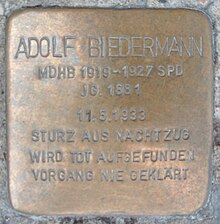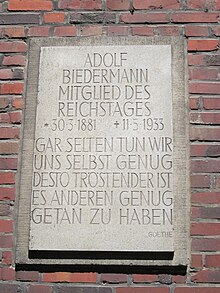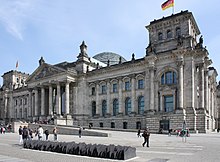Adolf Biedermann
Adolf Albert Bertram Biedermann (born March 30, 1881 in Hamburg ; † May 11, 1933 in Recklinghausen ) was a German social democratic politician and member of the Reichstag from 1926 to 1933.
Empire and First World War
Biedermann was born the son of a master painter, but lost his father at an early age. He grew up in an orphanage because his mother and the other five children and the continued painting business could not look after him. After attending primary school, after four and a half years of training, he took his exam as a journeyman locksmith in Eckernförde and then went on a hike . After two years in the military, he returned to Hamburg in 1903 and, in addition to his work in a machine factory, attended evening courses at the local workers' education association .
Biedermann joined the SPD in 1907 and became chairman of the Barmbek district in 1912 . With 10,000 members, the district was one of the largest local SPD associations in Germany. At that time he lived at Schmalenbecker Straße 25 in Barmbek-Süd , not far from the Wagnerstraße underground station (today: Hamburger Straße underground station ). He was also a member of the local administration of the German Metalworkers' Association of the Hanseatic city. Within the party, he was more of the right wing.
Even before the First World War , he made a name for himself in the Hamburg SPD as a speaker and by publishing articles in the workers' press. From 1914 he was supposed to attend the Reich Party School of the SPD in Berlin , which was prevented by the beginning of the war. During the First World War he did military service until 1918.
Weimar Republic and the time of National Socialism
In the course of the revolution of 1918 he was delegated to the labor office by the workers 'and soldiers' council and elected to the Hamburg parliament a year later . In 1919 he was also elected as SPD party secretary. As a replacement for Friedrich Paeplow he came to the Reichstag in 1926 , where he represented the SPD of constituency 34 (Hamburg) until 1933 alongside Gustav Dahrendorf and Hans Staudinger . At the same time, in 1927, he resigned from the Hamburg parliament. Since 1927 he was also the district chairman of the Reichsbanner Schwarz-Rot-Gold in Hamburg.
In the Reichstag vote on the Enabling Act of March 25, 1933, Biedermann and his parliamentary group voted “No”. On May 11, 1933, he was found dead next to the railway line near Recklinghausen; he had taken the train from Cologne to Hamburg the evening before . Even if the exact cause of death remained unclear, an attack cannot be ruled out in “times when political murder was on the agenda”. Just one day after the body was found, the Hamburg press, which had been brought into line, printed a message from the Recklinghausen police press office that Biedermann had “committed suicide”. No indications were given to support this assumption. His death was blamed on the National Socialists by the Hamburg Social Democrats and Communists . In contrast, the SPD exile executive in Prague reported in retrospect about a suicide in early 1934. There was no longer any rule of law and no independent police force. An autopsy was not carried out like this. If the National Socialists were guilty, they would not have tolerated an investigation against them. For insurance reasons, Biedermann's widow pleaded for an accident in a trial against the Reichsbahn. So the widow was awarded compensation.
His funeral on May 24, 1933 made thousands of Social Democrats a demonstration for their party and democracy. His tombstone bore the inscription “A fighter for freedom and socialism”. A year later, hundreds of people gathered again, some sources speak of thousands, at his grave and laid flowers. The protest against the Nazi regime was underlined by laying a wreath with a red ribbon and the words "DAE" (discipline, activity, unity).
Honor
In honor of Biedermann, the previous Schleidenplatz in the Barmbek-Süd district near his former place of residence on Jarrestrasse was renamed Biedermannplatz in 1947 ; a memorial plaque and a stumbling block on Jarrestrasse remember him. In Berlin, one of the 96 memorial plaques for members of the Reichstag who were murdered by the National Socialists is dedicated to Biedermann near the Reichstag .
In Hamburg, on June 8, 2012, stumbling blocks were laid in front of the town hall for the murdered members of the Hamburg parliament, including Adolf Biedermann.
literature
- Bernd Braun: Biedermann, Adolf . In: Hamburgische Biografie Vol. 6, pp. 33–34.
- Frank Müller: Members of the Citizenship. Victim of totalitarian persecution. 2nd, revised and expanded edition. Published by the citizens of the Free and Hanseatic City of Hamburg. Hamburg 1995, DNB 944894100 , p. 19f.
- Adolf Biedermann . In: Franz Osterroth : Biographical Lexicon of Socialism. Deceased personalities . Vol. 1. JHW Dietz Nachf., Hanover 1960, p. 24.
- René Senenko: Accidentally cleared: The grave of Adolf Biedermann (1881-1933) . In: Hans Matthaei (ed.): DenkMal Friedhof Ohlsdorf. 33 places of remembrance and warning . Published by the Willi-Bredel-Gesellschaft Geschichtswerkstatt eV; VSA Hamburg 2018, pp. 42–45, 2 figs., ISBN 978-3-89965-833-0 .
- Social Democratic Party of Germany (ed.): Committed to freedom. Memorial book of the German social democracy in the 20th century. Schüren, Marburg 2000, ISBN 3-89472-173-1 , p. 38f.
- SPD-Hamburg: For freedom and democracy. Hamburg Social Democrats in Persecution and Resistance 1933–1945. Hamburg 2003, pp. 27-28.
- Martin Schumacher (Hrsg.): MdR The Reichstag members of the Weimar Republic in the time of National Socialism. Political persecution, emigration and expatriation, 1933–1945. A biographical documentation . 3rd, considerably expanded and revised edition. Droste, Düsseldorf 1994, ISBN 3-7700-5183-1 .
Web links
- Literature by and about Adolf Biedermann in the catalog of the German National Library
- Adolf Biedermann in the database of members of the Reichstag
- Persecuted Social Democrats from Hamburg (PDF file; 1.64 MB)
- Memorial plaque in Jarrestrasse
- Biography of Adolf Biedermann . In: Wilhelm H. Schröder : Social Democratic Parliamentarians in the German Reich and Landtag 1876–1933 (BIOSOP)
- Biography of Adolf Biedermann . In: Heinrich Best and Wilhelm H. Schröder : Database of Members of the National Assembly and the German Reichstag 1919–1933 (Biorab – Weimar)
Individual evidence
- ^ Helga Kutz-Bauer: Guide to the sites of persecution and social democratic resistance in Hamburg. Ed. Working group of formerly persecuted social democrats. Hamburg 2005.
- ↑ Abg. Biedermann ended by suicide. In: Altonaer Nachrichten. No. 111, May 12, 1933, p. 7; Biedermann committed suicide. In: Hamburger Nachrichten. No. 219, May 12, 1933, p. 2; Detected suicide. In: Hamburg Correspondent. No. 219, May 12, 1933, p. 1; On the death of MP Biedermann. In: Hamburger Anzeiger. No. 110 of May 12, 1933, p. 7.
- ↑ Stumbling blocks for murdered MdHB final inscriptions City Hall Hamburg (PDF; 16 kB)
| personal data | |
|---|---|
| SURNAME | Biedermann, Adolf |
| ALTERNATIVE NAMES | Biedermann, Adolf Albert Bertram (full name) |
| BRIEF DESCRIPTION | German politician (SPD), MdHB, MdR |
| DATE OF BIRTH | March 30, 1881 |
| PLACE OF BIRTH | Hamburg |
| DATE OF DEATH | May 11, 1933 |
| Place of death | Recklinghausen |



